Collets were more famous for their bookshops, but they did sell records at a few of their premises over the years. Dealing mainly in jazz, folk, blues and world music they had, as indicated in the flyer on the left, a shop in New Oxford Street and also the basement of a bookshop in the Charing Cross Road. During the 1970's, they moved to bigger premises in Charing Cross Road, close to the Astoria. The record department was located in the basement and besides the usual folk, jazz and blues music on indie labels, they also had a section on eastern European music and loads of world stuff. The staff were incredibly knowledgeable. There was a fire there around 1979 in what I seem to remember as suspicious circumstances and unfortunately, the shop never reopened. Comment: Shamus Dark
Dave Peabody blues musician worked at Collets. Also Alan Bush of Tpoic records and the Workers Music Assoication.
Bert Jansch Interview
How did you come to record your legendary first album?
Well there used to be a London record shop in New Oxford Street called Collett's, which sold all sorts - jazz, folk and blues, there was a book shop there as well, which was run by Jill Cook and Ray... ah, I can't remember Ray's second name but he's still got a record shop near Shaftesbury Avenue called Ray's Jazz Shop. Jill was head of the folk section and ran a few clubs herself, if you wanted to know anything about clubs or singers or wanted to contact someone from that scene, that was the place you'd go. It was through her that I met Bill Leader. Bill was a field recorder, recordist or whatever who was working for Transatlantic records at the time.
A number of points to add. When New Oxford Street was re-developed, the Jazz and Folk Record Shop moved to Shaftesbury Avenue. Collets had several other places which were mainly bookshops – Collets London Bookshop (politics) and Penguin Bookshop (both on Charing Cross Road), Chinese Gallery (opposite British Museum), International Bookshop - the “new” one by the Astoria. This had relocated from Museum Street. The Folk music went to the basement of the new store but not the jazz – that stayed with Ray Smith, Bob Glass and I to become Ray’s Jazz Shop. When the record shop was in New Oxford Street, Ray ran the jazz in the basement. Noel Norris worked part time and I recall he and Ray used to shoot Russian Melodiya 78s with an air rifle in the back storeroom, shellac exploding everywhere. Ray’s favourite was a 78 called “I’m In Love With My Tractor”. For more about Ray (and Collets Jazz) see Rays Jazz on Cargo Collective website. The upstairs Folk Dept. was very important in the 50s and 60s in the development of British Folk music, with many visitors and musicians hanging out there. Bill Leader worked there and it was run by Gill Cook with Hans Fried. Piers Harker joined later. Bob Glass (married to country blues singer Jo Ann Kelly) worked in both folk & jazz sections. When Bob Dylan was based in London in 1962 he struck up a friendship with Martin Carthy, a frequent visitor to Collets, and Hans met Dylan on several occasions. Dylan apparently told him of a planned BBC TV performance (Evan Jones’ play “The Madhouse on Castle Street”) that he was in. Dylan was supposed to be the lead part, but that went to David Warner, Dylan singing some songs for it and having a brief part. Hans recorded the songs from his TV and these were featured on a later BBC documentary. It was during this time that Dylan recorded, as Blind Boy Grunt, for Doug Dobell’s ‘77’ label with friends Eric Von Schmidt and Richard Farina. Comment: Mathew Wright.
Re Jill/Gill Cook who ran the folk department and was the mother of Bert Jansch's first child Richard. A small correction. I have several letters in my possession from her to Bert Jansch concerning Richard showing that the spelling she used was Gill. Heather Jansch.
(Nov 3, 2014) Anonymous said:john larmour was my father and had the shop in charing cross road in the fifties there he took the blues legends to play when they were in london big bill broonzy was one l remember the shop a small ( even for a child ) space down the rickety stairs to the bins of records and the music playing flag like
(Sept 23, 2013) Jonathan Hill said:I used to hang out a lot in Collett's in Shaftesbury Ave. in the mid '70s. A very pleasant lady called Gill said to me " Have a listen to this, you'll love it! It's really bad taste!" I did, I do, it was (in the best way possible). I have been a fan of 5 Hand Reel ever since. She knew the stuff I bought, and she also had a pretty good idea when I was skint and when I was flush I think! So, Amazon, iTunes, Spotify...... shuvvit!
(May 28, 2013) Arie Euwijk said:I'm sure "..a bloke called Hans" is Hans Fried
(June 10, 2012) Charles Topham said:I had the priveledge of working saturday's at the old shop and then three to four days a week in the basement shop which was much smaller. It was a real blast working with people like Jill Cook, Piers Harker and Bob Glass..they taught me everything i know about really listening to music and their knowledge was beyond price.
It was fantastic because I met so many people there, Charlie Watts, John Peel, Joe Boyd, Eddie Campbell and so many other people, one favourite memory is hanging out with Slim Galliard who was such a sweet guy !! I often think about my days there, and I miss them. To Bob, Jill, Piers and Ray...always a place in my heart for you. The Commies were awful !!! :-)
(April 29, 2015) started shopping for records in Soho in the late 60's. I joined the trade in the early 70's as a delivery driver for Continental record distributors in Dean Street. The worked in the stock room making up orders and packing records. I moved to Collects's fold records in New Oxfrod Street in the mide 70's, selling over the counter. Shortly after, we were forced to move, to Shaftsbury avenue/Monmouth street. The in the ealry 80's the Folk shop moved into Collet'e international in Charing Cross Road. Thsi department closed in the late 80's. Comment: Piers Harker.
(September 17, 2015) Entertaining stuff, and I love the image of Ray Smith shooting Russian 78s with an air-rifle, but isn't it Collett's (two t's)? Comment: Mike Butler.
Hans Fried 'I worked in Collet's Record Shop in the folk department from mid May 1964 when I was 20 to May 1976. Gillian
Cook did less and less in the folk department. We had the skilled assistance from Tony Russell for a year. We then got the wonderful help from the devoted Piers Harker. Many famous pop stars were customers. George Harrison bought loads of Indian Classical music from me. I loved working there. It was a folk Mecca. Hans ( June 22, 2016).
Name Stephen Gammond Comment: Does anyone have any posters or images of Collets record store that they would let use in a film I am making about Davey graham, Alexis Korner met bill leader there prior to them recording anji so I would love some 'coverage'. cheers steve (May 2, 2017)
Hylda Simms folk musician worked here.
Comment
In her book "All in the Downs" Shirley Collins says (page 69) that she worked in Collets bookshop on Haverstock Hill. The poet Edgell Rickword also worked there.
Name
Ralph Stephen
(2019)
Comment
The fire took place on 6th July 1989.
http://bufvc.ac.uk/tvandradio/lbc/index.php/segment/0007500377014
I was there within an hour of the event.
Name
Ralph Stephen
(2019)
I studied cover notes that accompanied vinyl recordings on the Soviet Melodiga and Czech Supraphon labels at the shop on Charing Cross Road called Collets’ run by a communist family and trust.
Ed Villainy
In 1960 Bill began supplementing his income – or, perhaps more accurately, subsidising his interest in recording – by managing a folk and jazz specialist record shop, Collet’s, in New Oxford Street. The shop was one of several Collet’s bookshops and two record shops owned by a left-wing publishing house of the same name, associated with the British Communist Party. This one would become a key meeting place, and occasional postal address, for folk musicians in London during the coming decade.
Bill Carey Looks At The London Jazz Disc Jazz Scene. Image Mick Brocking
Collets Feb 2014


Extract from 'Roots, Radicals And Rockers'. Billy Bragg
Extract notes from CD box set Tranatlantic. David Wells
Bill Leader: The Man Who Paid The Pipers (Extract )
While Topic Records would never get involved in putting out records by TV personalities, Nathan ‘Nat’ Joseph, a Cambridge graduate, theatre and cabaret enthusiast and budding entrepreneur had no such foibles. Bill recalls their meeting one day in 1962, in Collet’s record shop:
This little fellow with a squeaky voice came in and tried to sell me some records he’d got the rights to, from America, called Live With Love – three albums of sex education which he thought were going to be a sure-fire winner. And I seem to remember he had an EP on how to give up smoking. I remember he rang the press agent in charge of getting the smoking EP off the ground and gave him such a mouthful of abuse it quite made my hair stand on end. He then suggested that maybe I should like to help him produce some records. Recently returned from a post-university year in America, Nat had come up with the idea of using 90 day credit to import various spoken-word recordings into Britain, including a language tuition series, while using 30 day credit to sell the records on to retailers. Based on the notion that the British public would be hugely interested in three subjects – the Queen (not known to be looking for a record deal), money (not an easy concept on record) and sex – he had settled on the third of these as a winning idea to kick off a record label. He had, in fact, not licensed but recorded Live With Love, with one Dr Eustace Chesser, using a pseudonym, to become the first three albums on his own label, Transatlantic Records.
Jazzjet Great memories, Big Beat Steve. I had forgotten about the Chilton's book shop, oddly because I used to work just around the corner. I grabbed some wonderful bargains there including some discographies which I still have and a battered,original copy of Leonard Feather's 'Inside Bebop'. Plus I used to buy my copy of Jazz Monthly there - always used to prefer JM to Jazz Journal.
And, of course, the 'Rare As Hen's Teeth' rack in Ray's. Even further back there was Collet's on New Oxford Street, where Ray ran the basement. I have fond memories of that basement as it was there that I did that rare thing - buying an LP on hearing it over the P.A. Twice in fact - Charles Lloyd's 'Forest Flower' and Don Ellis's 'Live at Monterey'.
Back to Ray's and those great window posters - 'From Bunk to Monk', 'From Barry Harris to Harry Barris'.
THE ROLLING STONES IN BLACKPOOL
July 1964
It was the Blitz that took me from London to Blackpool, where in the early-60s I formed my first bands, one of which, The Executives, supported The Rolling Stones at the Empress Ballroom, a show that ended in a major riot, something like 50 people, fans and police, hospitalised and the venerable venue virtually demolished, the ruin as severe as if the place had been plundered by Visigoths or others of their barbarian ilk. So miffed was local opinion, the Stones, in the aftershock of what happened, were banned from the battered municipality, told ne’er to darken Blackpool’s door again, a ban that was only lifted in 2008.
Before we went to live in Blackpool, my father, in the pre-war years, was a popular band leader in London, with residencies at many swish places, like Murray’s Cabaret Club, a private club, a favourite of gangsters and royalty, whose exclusive membership included the Duke Of Windsor, who liked to get up to play drums with the band or otherwise entertain his hooray chums by standing on his head on the dance floor. Having no particular talent for either enterprise was no handicap for the plucky royal, according to my dad.
The big bands of the era continued to play regularly after war broke out, and even into the Blitz, when London was bombed nightly. I think what happened with my dad and why he decided to move the family out of London was that he had a couple of lucky escapes and got to the point where he thought his luck was going to run out. He turned down a gig, for instance, at the Café de Paris that went to his friend, Ken ‘Snakehips’ Jensen, who was killed along with most of his band, when two bombs came straight through the skylight above the stage where they were playing. So dad started looking around for somewhere safer to move the family, me as a baby included. He knew some people in Blackpool, there were dance halls there, so that’s where we went.
It would become an absolute shit-hole later on, but Blackpool in the 60s, when I was growing up there, was a great place. It was where everybody went for their summer holidays, the town packed out for months on end. There used to be what were called Wakes Weeks, where whole towns in the north would shut down completely. The mills would close and everybody would come to Blackpool. The rowdiest Wakes Weeks were when what seemed like the entire population of Scotland turned up in town. The Glasgow Weekend was especially notorious, as the Stones would duly discover.
In those days, there were up to 16 live shows, right through the summer, featuring all the big stars of the time. You had the Tower Ballroom, and just up the road the Winter Gardens, which had the Opera House where Sinatra played; Judy Garland, too. The Winter Gardens also housed the Winter Gardens Pavilion, umpteen bars, an exhibition space and the Empress Ballroom, which held up to 7000 people, although there often seemed to be twice that number there.
There wasn’t a thriving local music scene like there was in Liverpool and Manchester, because there were no clubs apart from the Picador, which was run by a dyed-in-the-wool rocker named Arnold Franken, whose idols were Billy Fury and Johnny Kidd. Arnold told me one night, he’d had someone called Brian Epstein on the phone, offering him a deal to put on some bands in Blackpool over the summer, including The Beatles, who he’d never heard of. It so happened The Beatles were due on some early evening TV show and Arnold took a look and didn’t like what he saw. He watched it and he was appalled. He called Epstein and said, “I’ve just seen your fucking band on telly and they’re shit. If I put them on at my club, they'll be booed off.” He cancelled the contract and not long after that The Beatles were in the charts.
Gene Vincent lived in Blackpool for one summer. Completely off his fucking head, he was. One night we were at the house he shared with his backing band, who I think were called The Puppets. He comes in and he’s got a fucking big carving knife and he wants to know if anyone’s seen his wife, evidently having forgotten that a couple of days earlier he’d put her on a plane back to America.
My bands back then didn’t write a lot of original material, so we were constantly in search of songs to cover, so whenever I was in London I’d buy as many new records as I could. You were always on the look-out for something you hadn’t heard by Chuck Berry, Muddy Waters, Bo Diddley, whatever you could lay your hands on. There was a chain of shops you went to if you were a blues, folk or jazz fan. There was Doug Dobell’s at 77 Charing Cross Road, which had the folk shop next door where Dylan used to go. There was also Collette’s on New Oxford Street, and Imhoff’s, which is now a Starbuck’s opposite Centre Point. It was an electrical shop that sold TVs, radios and gramophones, and in the basement they had a record shop where they not only sold records you couldn’t get anywhere else, they had an import section, which was unheard of. You’d order your records and in a few weeks you’d get a postcard to say they were ready for collection.
One day, I went in to pick up some records I’d ordered – a couple of albums by John Lee Hooker, probably a new Chuck Berry – and there was this young bloke with long blond hair, cut in the shape of a helmet, arguing with the assistant. He’d seen my records behind the counter and wanted them because he was in a band from what I could hear him telling the assistant and had to have them, simple as that. He sounded quite desperate, but I just pushed him out of the way and said, “Fucking hard luck, mate. These are mine.” He stormed off in an obvious huff.
That night, I went down to The Marquee to see a new band Alexis Korner had told me about who were billed as ‘Brian Jones, Mick Jagger and The Rolling Stones’. Anyway, I was sitting in the bar and I noticed these surly types staring at me, and one of them, who was really glowering at me, was the little blond feller from Imhoff’s. He turns out to be Brian Jones, of course, which makes the people he’s with The Rolling Stones. One of them eventually came over, and introduces himself as Ian Stewart. He was lovely bloke, which is not something I’m sure you’d ever say of Brian. That night, I saw the Stones for the first time. It was early days for them, but already there was no one else like them. It was obvious they were going places, one of which turned out to be Blackpool on July 24, 1964, when they headlined the Empress Ballroom.
The Stones’ show coincided with the summer’s Glasgow Weekend, so there was always the potential for trouble. Glasgow Weekend brought a lot of money to Blackpool, but also a lot of drunkenness, noise and gang fights. You had to be able to handle the gangs if you wanted to avoid trouble. My band had played a lot of these shows and we knew how to deal with them. The first thing you did was find out what the most popular songs were in Glasgow clubs at the time and if it was something like “Skinny Minnie”, you learned it quickly and opened your set with it, usually to a big roar. I’d say to them, ‘”I don’t know about you, but we’re going to have a good time and we want you to have a good time, but you’ve got to behave yourselves.’ And sometimes they would. These guys would come up to you in the break betweens sets with fucking hammers in their pockets. You had to win them over, get them on your side, which is not something I think the Stones were interested in even attempting to do. It just wasn’t their style. They would have thought it was ingratiating, which they never were.
In those days, Brian thought the Stones were his group and he was the star, so he’d be right down the front of the stage. The girls were screaming for him, but their boyfriends got the hump because he looked so effeminate, much more so then than Jagger or Keith, who had a much more thuggish look. Anyway, Brian was just winding these blokes up, taunting them every time he came to the front of the stage, which fucked them off even more. These were all the gang leaders, of course, and they were lined up along the edge of the stage, which was high enough that you could only see their heads in the footlights. They started shouting obscenities at Brian, who didn’t pay any attention, which made them even angrier. So a couple of them began spitting at him. I’d never seen that before at a gig. It was the biggest insult you could get as a performer and I remember thinking things were getting out of hand.
I could see Keith fuming, glaring at the crowd. Someone shouted something at him and then spat at him. Keith headed straight for him, didn’t seem to give it a second thought, and kicked him – bang! – right in the face. The place just fucking exploded. There was absolute bedlam. The crowd stormed the stage and in seconds were all over it. The Stones just ran, crapping themselves. The crowd then started destroying everything in sight, smashing anything they could get their hands on. I managed to get our equipment off. Charlie had a nice set of drums that he’d just left when the riot kicked off and I banged them into some small room at the back of the stage and saved them for him. A couple of months later, I ran into Ian Stewart and he said, 'Thanks for saving Charlie’s kit. If it had been me, I wouldn’t have fucking bothered.’ The crowd, meanwhile, was taking the place apart. If they’d got hold of the Stones, they would have done the same to them. I’m convinced they would have killed them.
They’d legged it, though, and got out through a back window. It was the last anyone saw of them. The police had arrived by then, with dogs. It was war. How nobody actually got killed, I don’t know.
The riot was all over the papers the next morning, with a big splash on the cover of the Daily Express. I knew someone on the news desk there and called them up with the story. I got paid for it, too. In fact, I probably made more from selling the story than I did for the gig. Roy Carr





















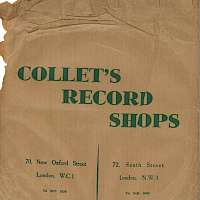
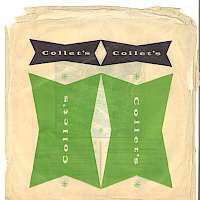
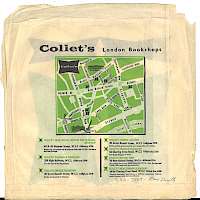
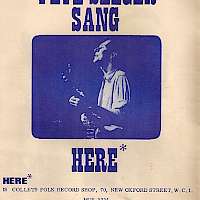
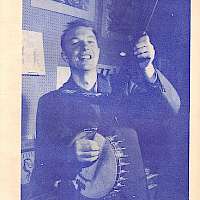
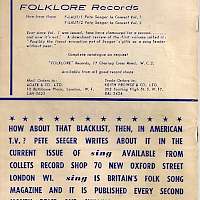
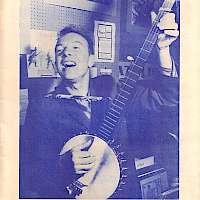
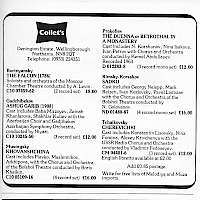
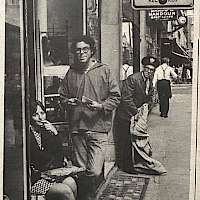
https://johnbcosgrave.com/archive/Nikhil_Banerjee.htm
Jill, Piers, if you get to see this do contact me. Thanks again over all these years! John (now 77)